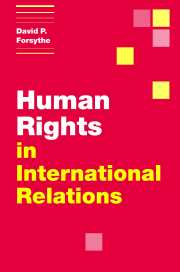9 - The politics of liberalism in a realist world
from Part III - Conclusion
Summary
This book has clearly shown the extent to which human rights has become a routine part of international relations. Michael Ignatieff has captured the trend succinctly but brilliantly: “We are scarcely aware of the extent to which our moral imagination has been transformed since 1945 by the growth of a language and practice of moral universalism, expressed above all in a shared human rights culture.” The language and practice of universal human rights, and of its first cousin, regional human rights, has been a redeeming feature of a very bloody and harsh twentieth century.
But the journalist David Rieff reminds us of a more skeptical interpretation of universal human rights. “The universalizing impulse is an old tradition in the West, and, for all the condemnations that it routinely incurs today, particularly in the universities, it has probably done at least as much good as harm. But universalism easily declines into sentimentalism, into a tortured but useless distance from the particulars of human affairs.” Or, to drive the same point home with a more concrete example, whereas virtually all states formally endorse the abstract principles of human rights in peace and war, “Combatants are as likely to know as much about the laws of war as they do about quantum mechanics.”
The international law of human rights is based on liberalism, but the practice of human rights all too often reflects a realist world. State interests rather than personal rights often prevail, interpersonal equality often gives way to disrespect for – if not hatred of – “others,” violent conflict is persistent, and weak international institutions are easily demonstrated.
- Type
- Chapter
- Information
- Human Rights in International Relations , pp. 217 - 237Publisher: Cambridge University PressPrint publication year: 2000

